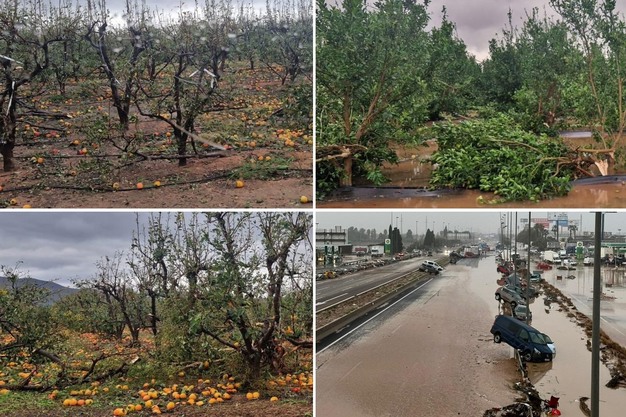The devastating environmental disaster caused by DANA has left a deep impact on large parts of Spain. Particularly in the regions of Valencia, Andalusia and Extremadura, the severe weather has claimed many lives and severely damaged infrastructure. This will have an impact on the (supply) situation in the fruit and vegetable sector in both the short and longer term, according to German companies with a focus on Spain.
"The most affected region of Valencia is one of the main growing areas for our citrus fruits and many of our long-standing partners and friends have been affected by the floods. Many citrus and persimmon orchards have been severely damaged. At the moment, it is not yet possible to provide any precise information about the damage to property. This information is currently being collected in the packing houses and fields," the purchasing and sales departments of the Black Forest-based company Llombart reports. However, there will already be significant losses in the quantity of persimmon in calendar weeks 45-46. "Our suppliers are talking about losses of 40 to 70 percent. As things stand, the harvest will be low throughout the season. In the case of citrus fruits, on the other hand, we do not expect any long-term losses from our suppliers. However, we will have to deal with quality problems in the coming weeks."
The family-owned company with Spanish roots would like to support its long-standing partners in these difficult times. "Our thoughts are with the victims and their families. We would also like to draw attention to the dramatic impact of this disaster. Let's work together to help and support the affected communities," the company wrote on social media.
 © Llombart / Roberto Tur
© Llombart / Roberto Tur
Impressions of the devastating effects of DANA: Complete citrus plantings, roads, villages and other infrastructure in the Valencia area were largely destroyed. Cleanup efforts are expected to be difficult and lengthy. Serious material damage to glasshouse horticulture in the Almeria region (in particular to tomatoes, courgettes, and cucumbers) is also already being quantified: approx. 3,400-4,400 ha were partially destroyed or damaged by hail.
Economic and human tragedy
"Although the damage in Valencia is not yet quantifiable, it will certainly run into the billions," reports Roberto Tur, a long-standing Spain specialist and managing director of the Fresh Fruit Alliance based in Friedrichshafen. The most important growing region for citrus fruits and persimmons is knee-deep in water. According to initial forecasts, there will already be losses of up to 60 percent for persimmons alone. Serious damage is also expected for avocados and vegetables. Tur also points out the importance of the city of Valencia as a fresh produce hub and logistics center for truck transport of fruit and vegetables from more southerly growing areas (e.g. North Africa). "A lot of the goods did not arrive at their destination. The floods are therefore not only hitting the Spanish fruit and vegetable industry hard, but agriculture in general. An economic and human tragedy."
According to Tur, the consequences for this year's season will be disastrous. "There will be bottlenecks and corresponding price increases, and we will notice this in the coming weeks. We will have to fill the resulting gaps with goods from other parts of Spain, as well as from Italy, North Africa, Greece and overseas. However, this will not be sufficient for certain products. I expect a sharp decline in the number of clementines in particular. It will certainly be hard, but experience has shown that the Valencians have always been masters of improvisation."
For more information:
www.llombart.de
http://vstur.de/
